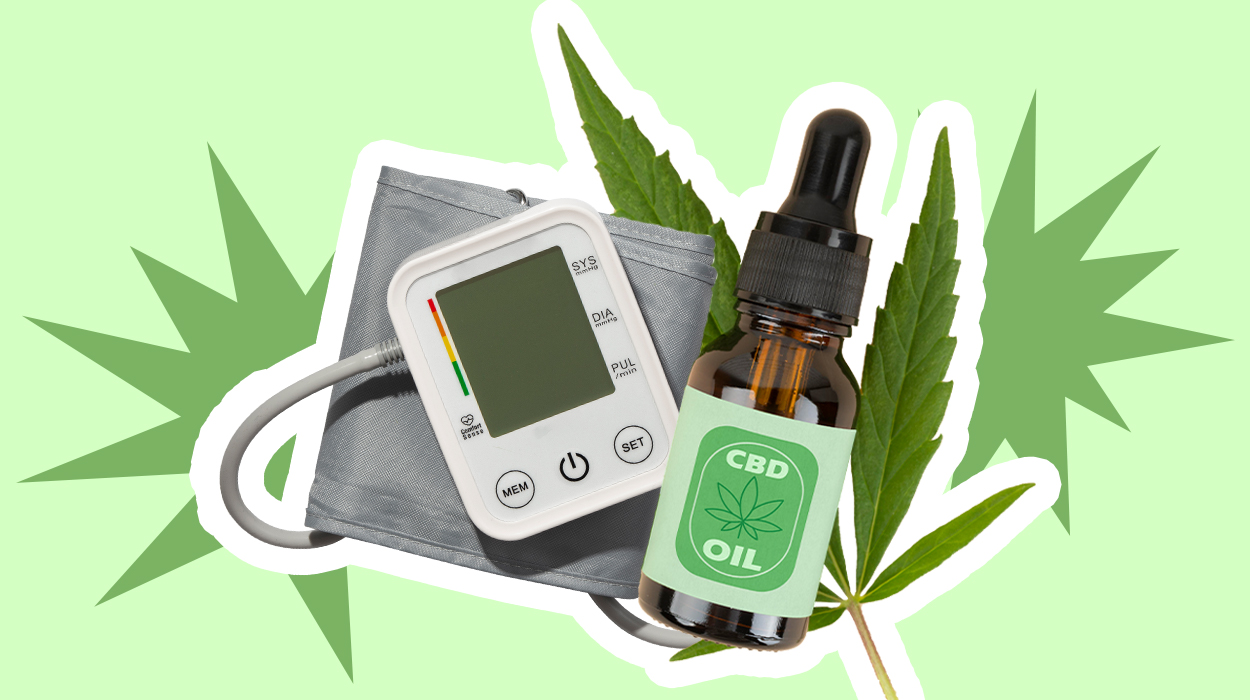You’ve heard the rumor that CBD can treat heart disease. You’re wondering: “Is this an option for me?”
Though cannabis is famous for containing tetrahydrocannabinol (THC), cannabidiol (CBD) is getting all the buzz right now. You can’t pass any health food store or gas station without seeing a CBD product touted as a panacea.
Though still in its infancy, research is happening to see if any anecdotes are true. This article will discuss what the study says. The conclusion may surprise you.
Can CBD Lower Heart Rate?
The short answer: Yes.
Both animal and human studies of CBD show that heart rate is affected by CBD. There is strong evidence that CBD will reduce how much your heart rate goes up when put under stress.
However, the jury is still out on whether or not CBD has a positive impact on heart rate under normal circumstances.
Let’s take a look at the research.
Does CBD Lower Heart Rate? What Does The Research Say?
High Blood Pressure

Animal studies show that CBD affects blood pressure (BP). Specifically, CBD appeared to reduce blood pressure when the subject was under stress. This is an important finding because it’s well-established that stressful conditions contribute to the development of cardiovascular disease.
Stroke
Heart disease is the top risk factor for stroke. A stroke can happen for two reasons:
- A clot blocks blood flow to the brain.
- A blood vessel in the brain bursts.
In 2010, the journal Pharmaceuticals published a review of the effects of CBD on strokes.[1] This analysis shows that cannabidiol (CBD) has many medicinal properties. These include anti-inflammatory, immunosuppressive, analgesic, anti-cancer, anti-anxiety, and antioxidant effects.
The research demonstrates that CBD is neuroprotective before, during, and after a stroke. This means that it reduces your chances of having a stroke in the first place. It keeps a stroke from getting worse. It helps you recover faster, and it improves survival rates.
The Effects Of CBD On Heart Rate
There are hundreds of active chemicals in the cannabis plant. These chemicals are called cannabinoids, and they affect your endocannabinoid system.
If you suffer from inflammation or disease, your endocannabinoid system fixes things. It’s in charge of keeping the body balanced. CBD has anti-inflammatory and antioxidant properties. These traits may help treat some leading causes of heart disease and related conditions, such as stroke.
CBD Vs. Stressful And Non-Stressful Conditions
In 2017, scientists ran a trial on healthy male volunteers. The data show that 600mg of CBD reduced the resting blood pressure of volunteers. It also reduces stress-induced high blood pressure (associated with an increased heart rate).
That same year, a review of over two dozen studies demonstrated the same benefits under stress. Still, it didn’t show the same results in non-stressful conditions.
Translation: It lowers your blood pressure and heart rate when they are elevated by stress. However, the jury is still out on how it affects resting CBD heart rate.
The research is promising, but we need more of it.
CBD & THC: Different Cannabinoids With Different Effects
Tetrahydrocannabinol (THC) is the dominant psychoactive chemical in the cannabis plant, making up anywhere between 1% to 40% of the mass. THC is most concentrated in the flowering body of the female plant, though not much is found in the male plant, which is called hemp.
Tetrahydrocannabinol is responsible for the high associated with cannabis and is the primary reason it’s so heavily regulated. THC increases autonomic arousal. This means that it stimulates all those automatic functions your body does without thinking, such as heart rate, blood pressure, and digestion. THC is associated with increased anxiety, alertness, and appetite.
Cannabidiol (CBD) is the second most prominent cannabinoid after THC. Unlike its more common sister, CBD does not make you high and is, therefore, easy to purchase as a supplement. It’s believed to work by giving your endocannabinoid system a powerful boost.
Your endocannabinoid system calms those autonomic functions, which is why it’s supposed to reduce heart rate, anxiety, inflammation, and the overactive signals in the brain that cause seizures. It’s also a popular sleep aid.
CBD makes up a much lower percentage of the cannabis plant. However, low-THC varieties have been produced by specialty breeding. If the plant contains less than .3% THC, it is considered hemp, and you can find it in places where marijuana is illegal. This is where we derive full-spectrum CBD oil, which contains many non-psychoactive cannabinoids. You can also purchase CBD isolate, which is pure CBD, though you may find that it doesn’t work as well.
CBD And THC: The Entourage Effect
THC and CBD can be taken together or separately, but they seem to do best together. Research suggests that consuming them together enhances the positive effects of each by canceling out the harmful properties. For example, CBD may counteract the anxiety-inducing effects of THC. In contrast, THC cancels out the drowsiness that can come with CBD.
A recent study out of Ontario found that CBD not only reduced anxiety but also eliminated the addictive-like behavior sometimes associated with THC. This is why most patients prefer a full-spectrum product, no matter which cannabinoid they target.
Are There Risks Of Using CBD For Lowing Heart Rate?
CBD oil doesn’t seem to have very many side effects. However, a recent and controversial study[2] suggested that CBD can cause liver damage.
But don’t panic quite yet. There are three problems with the study.
- It’s An Animal Study. Animal studies are helpful for early research, but the findings don’t always translate to humans.
- The Dose Of CBD Was Insanely High. The mice in the study’s first phase were given the human equivalent of 1400mg of CBD daily. The typical recommended dose is usually less than 50mg. So these mice that got sick were given the equivalent of a month’s worth of CBD every day! In the second phase, the mice had even more!
- It’s Outnumbered By Studies That Say The Opposite. There isn’t much research yet, but at least four other studies in the last decade have suggested that CBD oil treats liver disease. No other studies have corroborated the liver damage theory.
The bottom line: we need more research. Very high doses of CBD might cause liver damage. Still, no studies indicate that CBD at typical doses is dangerous for healthy adults.
Does CBD Interact With Heart Medications?
There may be interactions. CBD is processed by the liver using the same enzymes as 60% of medications on the market. If enzymes are busy metabolizing the CBD, that might let more of the other drugs enter your system.
Talk to your doctor before introducing CBD if you’re taking other medications. They’ll be able to monitor you to see if your dose needs to be adjusted.
How To Use CBD Safely?
The Food and Drug Administration (FDA) has approved CBD for treating epilepsy. It’s marketed in a purified form called Epidiolex. This medication is not approved for any other conditions.
CBD products are also available over the counter as non-regulated supplements. You can find it in products such as
- Vaporizers for inhalation
- Gummies for oral use
- Tincture for sublingual use
- Oils, lotions, salves, and patches for topical use.
Of the many administration methods, sublingual use (under the tongue) is considered one of the safest and possibly the most effective.
Inhalation is hard on the lungs. It can take a long time for edibles to kick in. Topical applications are great for dermatological ailments but aren’t as great for systemic diseases.
There are many blood vessels under the tongue. The CBD oil can cross directly into the bloodstream when the tincture is placed there. This method has virtually no side effects and is one of the fastest ways to feel results.
You must be very careful when selecting CBD products. Because there is no regulation, it can be difficult to confirm a product’s quality or the dose of CBD. You must pick a vendor you can trust.
Conclusion
Every day, something new comes out about cannabis. Yet scientists have barely scratched the surface of what this plant can do. Cannabidiol reduces blood pressure and heart rate in stressed individuals. It is unclear if it has a net positive effect on the cardiovascular system.
More research is needed before Cannabidiol oil can be declared a treatment for heart disease. That said, there aren’t many risks associated with trying it. Be sure to talk to your doctor first, mainly if you take other medications.
Frequently Asked Questions
Research shows[3] that CBD does not lead to dependency or tolerance. Dependency is a physical addiction. Tolerance happens when the body grows less sensitive to a drug, making you request higher and higher doses.
Side effects of CBD are uncommon and mild at typical doses. These side effects include drowsiness, dry mouth, and reduced appetite.
Doctors are most concerned about vaping causing lung damage. We don’t know if vaping CBD causes damage or to what extent. As a method of administering therapeutic cannabidiol, it is extremely effective at quickly getting a large dose into the bloodstream. For patients with conditions like panic attacks and migraines, the benefits of getting the treatment fast may outweigh the risks of lung exposure.
 Expert's opinion
Expert's opinion
